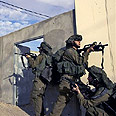
3 questions of confusion
Ariel Rubinstein presents some weighty questions in respect to Gaza op, upcoming elections
1. In all of Israel’s wars, most of Israel’s soldiers maintained “purity of arms” and moral conduct, though some “irregular acts” occurred. Is it possible that the IDF soldiers of the winter of 2008-09 are of an even higher quality? Could it be that Israeli society is plagued by violence at nightclubs, in the streets and on the roads, yet the young Israelis in uniform are all “different”? Is it possible that the pressure, the fear, the feelings of vengeance and the chill of night have not led some of them to deviate from the army’s orders? Could it be that a society that does not excel in respecting others has, nonetheless, raised a generation of soldiers who all maintain strict respect for the dignity and property of Palestinians when resting in their bedrooms? If the lack of reports about exceptional incidents reflects the actual conduct on the ground in the Gaza Strip, then it shows that Israeli society has indeed improved and constitutes a source of pride for all of us. However, because the IDF has been so effective in implementing the lessons of the Second Lebanon War, we are unable to confirm that this is not a mere fantasy. In order to enable us to confirm our moral greatness, would it not be best to return the cell phones to the IDF soldiers in Gaza and allow journalists to accompany them and file reliable reports from there, without the Military Censor preventing them from publishing “irregular” news?
2. The leaders of the campaign speak (or remain silent) as if they are putting aside personal and party considerations. Ostensibly, this reflects an amazing improvement in the quality of Israel’s leaders as well. In the past, Israeli politicians (not to speak of foreign leaders and enemy leaders in particular) have not hesitated to mix elections and wars. Throughout the world, politicians are people with inflated egos, who find it harder than other people to suppress their urges. It is hard to imagine that a reasonable person in the place of Barak or Livni would ignore the election trauma of 1996 and initiate a ceasefire that will likely be violated with a volley of Qassams two days before the elections, and three days before Netanyahu celebrates his glorious victory. So, despite the fact that I have no (additional) reason to doubt that Olmert, Barak and Livni are three leaders of a different type, perhaps it would be worthwhile for us all to verify that “a redeemer has come to Zion.” Instead of talking about postponing the elections, why not hold them earlier? Everyone knows the candidates, the campaign propaganda is boring and another season of “Survivor” has already begun. If there are technical difficulties involved in conducting elections under fire, they could be held over the course of two days. In short, why not hold the elections next Tuesday?
3. The elections of 2009 are also described as critical. I personally find it hard to discern the substance of the historical decision. The three large parties are surprisingly similar this time. Their leaders agree that we should exact an endless price of blood from the enemy and make the rest of its miserable life more burdensome – all in order to restore the deterrent power the IDF has lost. All of them want Israel to persuade the world that the boss in the Middle East knows how to go crazy. The three of them only intend to promote negotiations with the Palestinians and do not have the guts to evacuate settlements. All of the parties declare their desire for peace with Syria without conceding all of the Golan Heights. There is also no significant difference in the positions of the parties in regard to social, economic and religious issues. And I almost forgot: All of them are in favor of changing national priorities and assigning top priority to education. The most important question I find in the 2009 elections is whether Ephraim Sneh will receive more votes than Uzi Dayan received in the previous elections. And here is another reason to hold the elections earlier: The elections in 2010 will surely be even more crucial.










